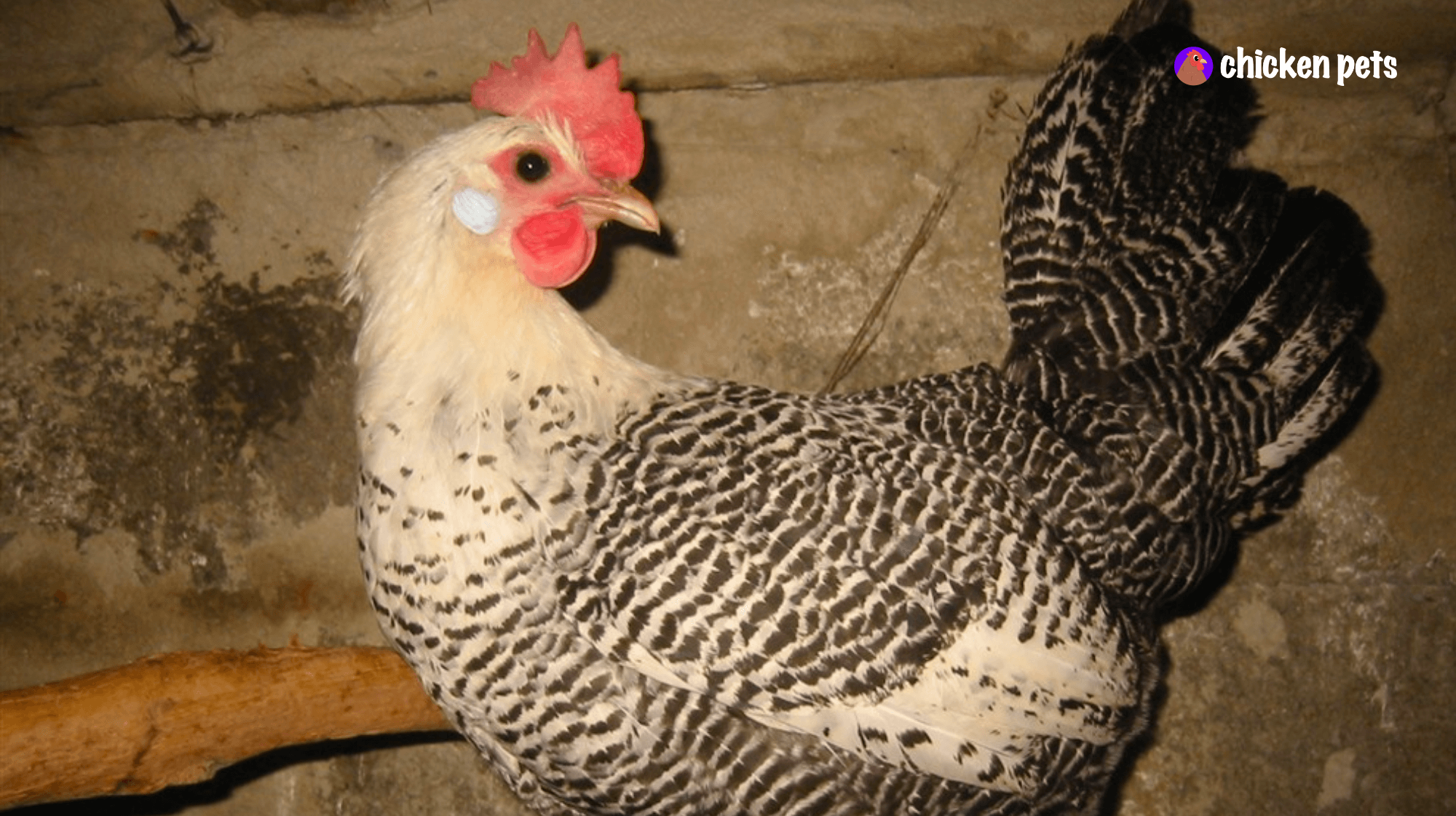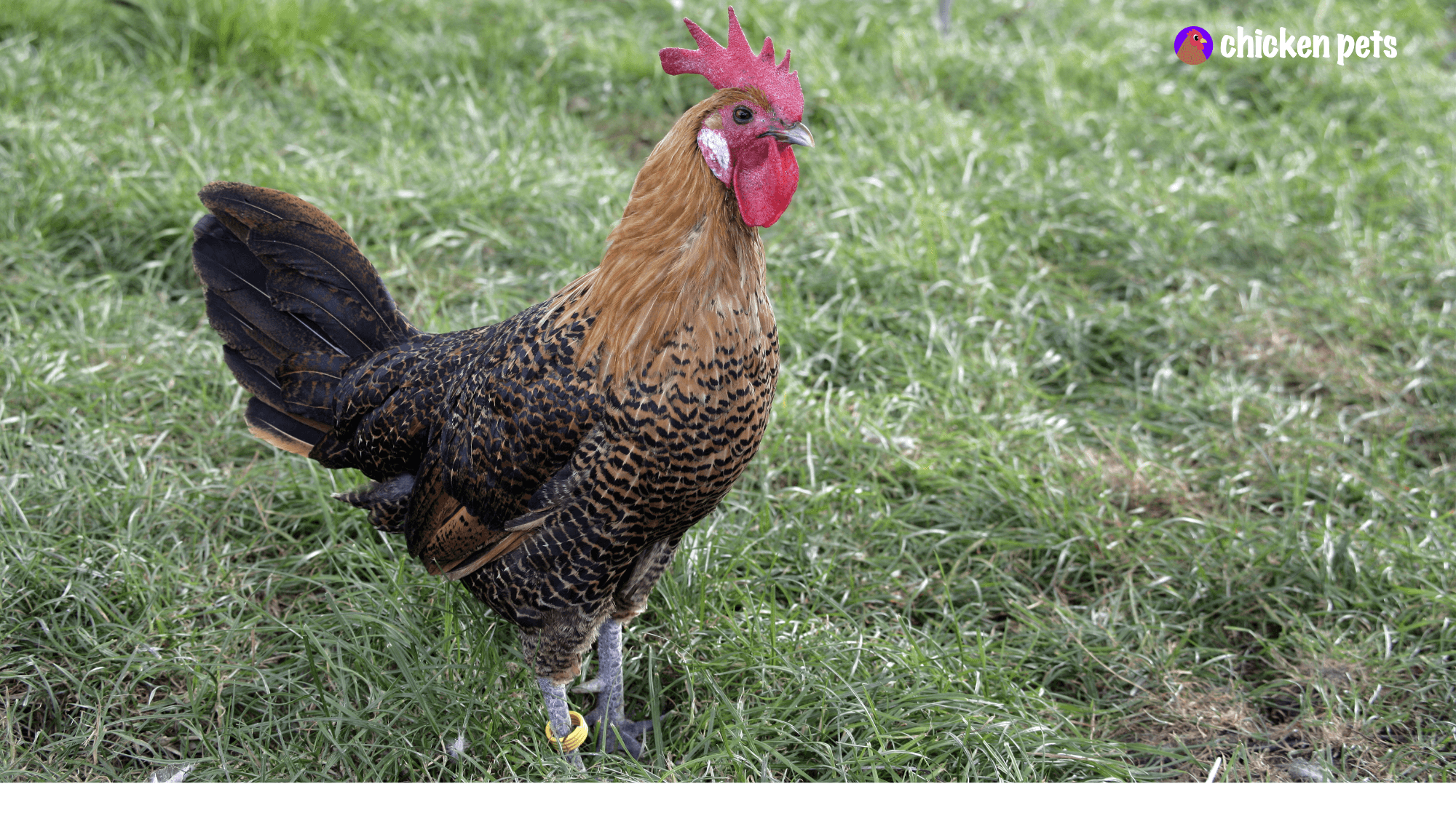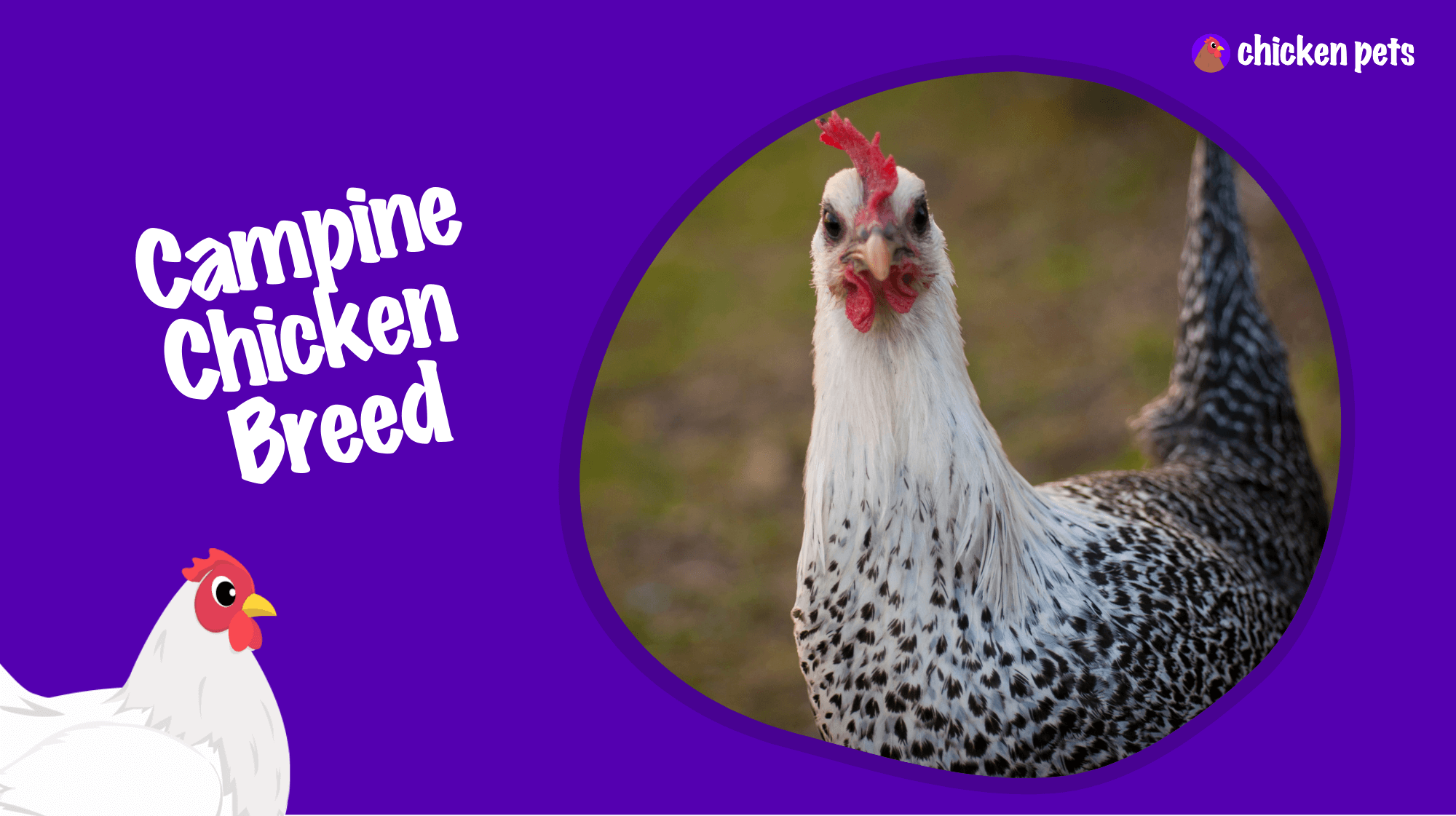Welcome to the Wonderful World of Campine Chickens!
If you’re looking for a unique and beautiful chicken breed, look no further than the Campine. These birds are a sight to behold with their stunningly soft feathers, elegant posture, and their signature mohawk-like crest. But don’t let their beauty fool you; these chickens are more than just a pretty face. Not only are they excellent egg layers, but they also have a wonderful personality and make great backyard pets. Keep reading to find out all about Campine chickens, from their history to how to care for them.
What is a Campine Chicken?
A Campine is a chicken breed originating from the Campine region of Belgium. It is a dual-purpose breed, which is raised for its eggs and meat. Campine chickens are known for their unique coloring and feather patterns, with a reddish-golden hue and white mottling. They are also noted for their hardiness and good temperament, making them popular as backyard chickens.
Campine chicken breed facts.
| Chicken Fact | Description |
|---|---|
| Breed Name | Campine |
| Size and Weight | Medium-sized, males weigh about 5.5 lbs and females weigh about 4.5 lbs |
| Egg Laying Rate | 150-200 eggs per year |
| Egg Color and Size | White eggs, medium-sized |
| Temperament and Personality | Friendly, active, and curious |
| Hardiness | Very hardy, can tolerate cold and hot weather |
| Resistance to Common Chicken Diseases and Parasites | Resistant to Marek’s disease, lice, and mites |
| Popular Uses | Egg production and exhibition |
| Specific Care Requirements | Needs plenty of room to forage, needs to be kept in a secure area to prevent predators |
| Life Expectancy | 7-10 years |
| Origin and History | Originally from Belgium, developed in the late 19th century |
A poultry PSA: Your chicken may vary
Please note that chickens are like snowflakes, no two are the same. The facts presented are a general idea of what to expect. Your chicken may vary in size, weight, egg-laying rate, and general attitude. Treat them like individuals and you'll be just fine!
Campine chicken breed appearance and characteristics.

Campine Chickens: The Charming Feathered Friends
Campine chickens are a delightful breed of chicken with a unique look and personality. They are a medium-sized, hardy bird that is perfect for backyard flocks or showing in poultry shows. They have a beautiful and unique feather pattern, a striking comb and wattle, and an overall eye-catching body conformation. Let’s take a closer look at the Campine chicken and all of its wonderful characteristics!
Size and Weight
Campine chickens are a medium-sized bird, typically weighing in at around 4-5 pounds. They have a slim and graceful build and are known for their agility and speed.
Feather Color and Pattern
Campine chickens have a beautiful, unique feather pattern and color. Their feathers are usually a mix of black, white, and gray, giving them a truly stunning appearance. They have a single comb, which is usually white or gray in color, and a small, neat wattle.
Overall Body Conformation
Campine chickens have a graceful, long body with a deep chest and a long tail. Their legs are usually a reddish-brown color, and their wings are usually black or gray with white or gray barring. They have a small, neat head with a single comb and small wattles.
Hardiness and Resistance to Diseases and Parasites
Campine chickens are a very hardy breed, and they are known to be quite resistant to common chicken diseases and parasites. They are also known to be quite active and curious, making them a great choice for backyard flocks.
Campine chickens are a delightful breed of chicken with a unique look and personality. They have a beautiful feather pattern, striking comb and wattle, and an overall eye-catching body conformation. They are also a very hardy breed, and they are known to be quite resistant to common chicken diseases and parasites. The Campine chicken is an excellent choice if you’re looking for a charming and hardy addition to your backyard flock!
Campine chicken breed egg-laying ability.
Ah, the Campine chicken! This beautiful breed of chicken is known for its egg-laying prowess. With an average of 200-300 eggs per year, the Campine chicken is a reliable source of eggs for any chicken farmer.
Egg Color, Size, and Production
The eggs of a Campine chicken are usually a delicate shade of cream, with a small to medium size. They are known for having a consistent production of eggs throughout the year, with no major fluctuations, which makes them perfect for farmers who want a reliable source of eggs.
Age and Care Requirements
Campine chickens usually begin laying eggs around 18-20 weeks of age and have a laying cycle of about 24-26 weeks. To ensure a steady supply of eggs from your Campine chickens, make sure to provide them with a diet rich in protein and calcium, as well as a clean, dry environment. Additionally, give them plenty of space to roam and exercise, as this will help keep them healthy and productive.
The Bottom Line
So, if you’re looking for a dependable source of eggs, then the Campine chicken is the breed for you! With their consistent egg production, delicate eggs, and easy care requirements, the Campine chicken will provide you with a steady supply of eggs for years to come. Now, who’s ready for some scrambled Campine eggs?
Campine chicken breed personality.

Personality and Temperament of the Campine Chicken
When it comes to personality, the Campine chicken is a real charmer. These birds have an outgoing and friendly disposition, making them easy to handle and great for beginners. They are also quite gregarious, and enjoy the company of other chickens and even other animals – so they are sure to be a hit at the farm!
Disposition towards Humans
The Campine chicken is incredibly friendly and outgoing, and they are known to form strong bonds with their owners. They are also quite curious, and will investigate anything new that you bring home. They are usually quite happy to be picked up and held, and will often follow their owners around the yard.
Sociability with Other Chickens
The Campine chicken is a highly social bird, and they do very well in groups. They can be quite boisterous, and love to explore and play with their flockmates. They are also known to be good egg layers, and are often willing to share their eggs with other chickens.
Foraging Behavior
The Campine chicken is an excellent forager, and loves to explore the yard and garden for bugs and tasty treats. They are also quite adept at finding their own food, and will often forage for hours on end.
Ease of Taming
The Campine chicken is one of the easiest breeds to tame. These birds are quite docile, and will quickly become accustomed to being handled and petted. They are also quite receptive to training, and can be taught a variety of tricks.
Hardiness in Different Climates
The Campine chicken is a very hardy breed, and can withstand a wide range of temperatures. They can do well in both hot and cold climates, and are known to be quite tolerant of rain and snow.
Noise Levels
The Campine chicken is not particularly loud, but they will make some noise when they are excited. They tend to be quite vocal during the day, but will usually quiet down at night.
Campine chicken breed types and sub-breeds.
Campine chickens are a breed of small, hardy chickens that were developed in the Belgian provinces of Antwerp and Limburg. They are a dual-purpose breed, with hens laying a good number of white eggs and roosters having a good meat yield. Campines are known for their gentle nature and good egg-laying ability. In recent years, hybrid and mixed breeds of Campine chickens have been developed to bring out the best qualities of the breed.
- Barnevelder Campine — This hybrid breed is a combination of the Barnevelder and Campine breeds. They have a unique feather pattern, with both black and cuckoo-colored feathers, and are known for their good egg-laying ability. They are also quite hardy and good at foraging.
- Campine Bantam — This breed is a mix of Campine and bantam breeds, resulting in a small, hardy bird with a good egg-laying capacity. They are very friendly and easy to handle, making them a good choice if you are looking for a pet chicken.
- Campine Orpington — This hybrid is a combination of Campine and Orpington breeds. They have a large, fluffy, and docile nature, making them good all-around birds for both egg production and meat production. They also have good foraging abilities.
- Campine Wyandotte — This hybrid is a combination of Campine and Wyandotte breeds. They have a good egg-laying capacity and are quite hardy and easy to handle. They are also good at foraging, making them a good choice for free-ranging flocks.
- Faverolles Campine — This hybrid is a combination of Faverolles and Campine breeds. They have a good egg-laying capacity and are quite hardy and docile. They also have a unique feather pattern, with both black and cuckoo-colored feathers.
- Light Sussex Campine — This hybrid is a combination of Light Sussex and Campine breeds. They have a good egg-laying capacity and are quite hardy and docile. They also have a unique feather pattern, with both black and cuckoo-colored feathers.
- Rhode Island Red Campine — This hybrid is a combination of Rhode Island Red and Campine breeds. They have a good egg-laying capacity and are quite hardy and docile. They also have a unique feather pattern, with both black and cuckoo-colored feathers.
- Silver Laced Campine — This hybrid is a combination of Silver Laced and Campine breeds. They have a good egg-laying capacity and are quite hardy and docile. They also have a unique feather pattern, with both black and cuckoo-colored feathers.
- Speckled Campine — This hybrid is a combination of Speckled and Campine breeds. They have a good egg-laying capacity and are quite hardy and docile. They also have a unique feather pattern, with both black and cuckoo-colored feathers.
- White Leghorn Campine — This hybrid is a combination of White Leghorn and Campine breeds. They have a good egg-laying capacity and are quite hardy and docile. They also have a unique feather pattern, with both black and cuckoo-colored feathers.
These hybrid and mixed breeds of Campine chickens are a great way to bring out the best qualities of the breed. They have a good egg-laying capacity and are quite hardy and docile, while also having unique feather patterns and good foraging abilities.
Tips on how to care for campine chickens. Raising campine chickens in a backyard setting.
Raising Campine chickens in a backyard setting is a rewarding experience that can provide families with fresh eggs and a beautiful addition to the landscape. Here are some tips to help ensure your Campine chickens stay healthy and safe.
Feeding and Nutrition
- Provide a balanced diet of layer feed, fresh fruits and vegetables, and grit.
- Feed chickens in the morning and evening, and always provide fresh, clean water.
- Keep feeders and waterers clean and free from contamination.
Housing and Shelter
- Provide a secure chicken coop with plenty of ventilation.
- Ensure the coop is predator-proof and offers protection from the elements.
- Provide nesting boxes for egg-laying and roosts for sleeping.
Health Care
- Monitor chickens for signs of illness or parasites.
- Provide dust baths to help prevent parasites.
- Keep coop clean and free from droppings and other debris.
- Consult a veterinarian as needed.
Breeding and Egg Production
- Provide a breeding pair of chickens to ensure egg production.
- Collect eggs regularly to ensure freshness.
- Provide nesting boxes for egg-laying.
Safety
- Ensure the coop is secure and predator-proof.
- Keep chickens confined to the coop or run during the night.
- Monitor chickens for signs of predators or other threats.
Pros and cons of having Campine chickens as pets.
Campine chickens are a unique and interesting breed of chicken that make great pets! With their friendly and gentle nature, they are a great choice for those looking for a pet that is low maintenance and provides lots of eggs. Let’s take a look at the pros and cons of owning Campine chickens.
- Pros:
- Egg-Laying Ability: Campine chickens are excellent egg layers, producing up to 250 eggs per year.
- Nature: Campine chickens are known for their friendly, gentle, and docile nature.
- Hardiness and Resistance to Disease: Campine chickens are hardy and resistant to many common diseases.
- Maintenance Requirements: Campine chickens require minimal maintenance, making them a great choice for those who don’t have a lot of time to dedicate to their pet.
- Usefulness: Campine chickens can provide you with delicious eggs, making them a great addition to any homestead.
- Companionship: Campine chickens make great companions and can provide hours of entertainment.
- Cons:
- Noise: Campine chickens can be quite noisy, so if you live in an area with noise restrictions, this may not be the best choice for you.
- Space Requirements: Campine chickens need a lot of space to roam, so you’ll need to make sure you have enough room for them.
- Cost: Campine chickens can be quite expensive, so you’ll need to make sure you can afford them before purchasing.
FAQ about Campine chickens.
Are you curious about the Campine chicken breed? Do you want to know more about these amazing birds? Get ready – this FAQ is here to answer your cluckin’ questions! From experienced farmers to first-time owners, let’s explore the unique characteristics of the Campine chicken breed and discover why they are so popular.
What is a Campine Chicken?
A Campine chicken is a beautiful and unique breed of chicken that originated in the Campine region of Belgium. They are known for their stunningly striking color, their friendly nature, and their ability to lay up to 200 eggs a year!
What Color is a Campine Chicken?
Campine chickens have a stunning golden-laced plumage with a black tail and neck that really makes them stand out in a crowd.
What is the Temperament of a Campine Chicken?
Campine chickens are known to be quite friendly and outgoing. They love to interact with people and are very inquisitive when it comes to their surroundings.
How Big is a Campine Chicken?
Campine chickens are a medium-sized breed and typically weigh between 4 and 5 pounds.
Where Does the Campine Chicken Come From?
Campine chickens were originally bred in the Campine region of Belgium and are still quite popular there today.
How Long Do Campine Chickens Live?
Campine chickens typically live for 8 to 10 years, depending on their living conditions and care.
What is the Egg Production of a Campine Chicken?
Campine chickens are known to lay up to 200 eggs a year, making them an excellent choice for backyard chicken keepers.
Do Campine Chickens Make Good Pets?
Yes, Campine chickens make excellent pets! They are friendly and inquisitive, and they love interacting with people.
What is the Best Way to Care for a Campine Chicken?
The best way to care for a Campine chicken is to provide them with a safe and secure environment, plenty of fresh food and water, and plenty of room to roam and explore.
Do Campine Chickens Need a Rooster?
No, Campine chickens do not need a rooster to lay eggs. They are a very prolific breed and can lay eggs without a rooster.
What is the Best Diet for a Campine Chicken?
The best diet for a Campine chicken is one that is high in protein, calcium, and other essential vitamins and minerals. A healthy diet of fresh fruits and vegetables, grains, and high-quality commercial feed can give them all the necessary nutrients.
What Diseases are Common in Campine Chickens?
Campine chickens are generally quite hardy and resistant to most common chicken diseases. However, they can still be susceptible to certain diseases, such as coccidiosis, so it’s important to keep an eye on their health.
Do Campine Chickens Need Vaccinations?
Yes, Campine chickens should receive vaccinations for common chicken diseases such as Marek’s disease and fowl pox. It’s important to consult with your veterinarian to determine the best vaccination schedule for your flock.
Are Campine Chickens Cold Hardy?
Yes, Campine chickens are quite cold hardy and can tolerate cold temperatures quite well. However, it’s important to make sure they have plenty of warm and dry bedding during the winter months.
How Much Space Does a Campine Chicken Need?
Campine chickens need at least 4 square feet per bird to stay healthy and happy. If you have a larger flock, you’ll need to provide more space for them to roam and explore.
Are Campine chickens for me?
All in all, the Campine chicken is a wonderful breed. With its beautiful, long feathers, its sweet personality, and its egg-laying capabilities, it’s no wonder that this breed has been around for centuries! Its unique types and sub-breeds make it a great addition to any backyard, and with the right care, these chickens can provide you with years of joy and fresh eggs. So, if you’re looking for a feathered friend, the Campine chicken is definitely worth considering!
So, if you’re looking for a pet that’s a bit more special than the average, why not consider the Campine chicken? With its unique traits and characteristics, it’s sure to bring plenty of joy and entertainment to your backyard. Plus, you’ll have the added bonus of fresh eggs every day!

















